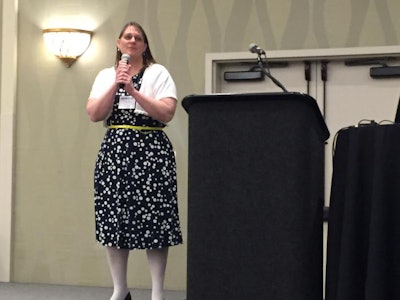
Millennials are an important part of a company’s workforce who are redefining “work” from the ways previous generations have viewed it. As baby boomers increasingly retire, hiring more millennials will be necessary, but recruiting and retaining them could be challenging for companies that do not align with the new ways millennials work, Joanne Loce, president, Loce Consulting LLC, and managing partner, Fortify Leadership Group, told audience members at the 2017 Feed Mill Management Seminar, held March 22-23 in Nashville, Tennessee, USA.
The workplace has evolved from what it was when baby boomers and even Gen Xers first entered the workforce. Gone are the days when an employee comes into an office, sits down at a desk from 9-5 to do their work and then goes home for the day: The workplace is now more connected, diverse and technological than ever. Outcome-driven millennials demand greater flexibility and the ability to do their jobs how, when and where they want.
In terms of the workplace, “How we were raised has a significant impact in terms of how we show up,” she said.

Joanne Loce, president, Loce Consulting LLC, and managing partner, Fortify Leadership Group | Photo by Alyssa Conway
Understanding what millennials bring to the table
To recruit millennials, pet food companies need to ensure they understand the role millennial workers play in their organization. According to Loce, companies must answer the question of why they want to hire millennials in the first place – and not just, “because I have to.”
“You need to be able to answer that question – what is it about the next generation of talent that is intriguing, interesting, relatable to your organization? Take the time to define that,” she said.
Hiring millennial workers in the pet food industry means that they may also come with some gaps in terms of skills or education from things not taught in schools. So, Loce said, it is important to address these gaps by letting them know the company is a place for them to not only come and apply their current knowledge and skills, but also that there is a plan in place to help them learn and grow.
Messaging key in a "we over me" generation
Regardless of generation, we as a society are very dependent, Loce pointed out, and this is even more so true of the millennial generation that values “we over me.”
“When people are making big life decisions … they’re checking in with the ‘we.’ That’s a pretty significant shift,” she told the audience.
Much like checking a product’s reviews on Amazon or checking a restaurant’s reviews on Yelp, millennials check in with their peers for advice on everything – and this includes deciding where to work, too. Millennials absolutely pay attention to what others are saying, Loce said, noting websites like Glassdoor and Indeed that provide details of what it’s like to work for a company.
“They will check there first,” she said.
Loce emphasized this is why properly messaging your company culture – the No. 1 driver of why people want to work for a company – is so important. To effectively recruit younger workers, companies need to communicate their culture in a way that is attractive to millennials. Millennials want a flexible work environment, where they feel like their ideas are being heard and they can grow and develop. Companies need to think about how their messaging aligns with these desires and the roles millennials will play, making sure this messaging is authentic.
Companies looking to recruit millennials should also clearly define and communicate their employee value proposition, or those things employees receive in return for coming to work (pay, training, benefits, opportunities to volunteer, etc.).
“If you’ve never thought about this and this is offensive to you, then it’s going to be time for you to rethink, ‘How do we attract talent?’” said Loce. “Coming to work and just getting paid is not the value proposition that some employers are offering to millennials, which means they’re going to go work for someone else.”
Tips for engaging millennials
The needs and wants of employees are evolving across generations to fit into a changing workplace. As more millennials enter the workforce, companies need to rethink their strategies for engaging this new generation of workers. Loce offered some tips for retaining millennials:
- Continue to develop millennials: Invest in employee education, focusing on soft and technical skills, especially allowing for mobile and online learning.
- Nurture millennials: Mentoring and feedback are valued by millennials. Pair them up with someone more experienced in your organization, who has a real passion for sharing their knowledge.
- Include millennials: Listen to their ideas to solve business problems, make them feel like a colleague who contributes value, and communicate with them.
- Invest in the whole employee: Millennials are a generation geared toward health and fitness, so supporting employee wellness programs could be a point of differentiation for your company.
- Enable involvement in community events: Be creative with your community sponsorship policies, for example, providing opportunities to volunteer or supporting a cause or event that an employee is involved in.


















